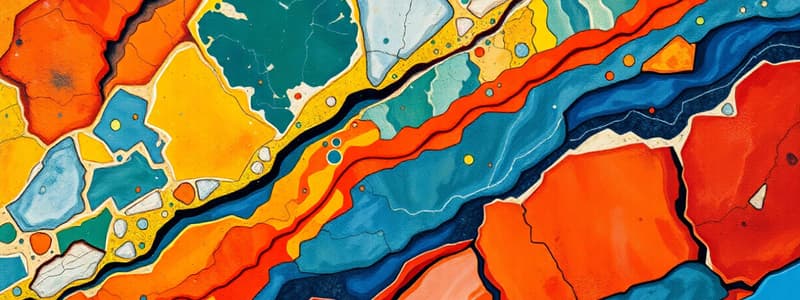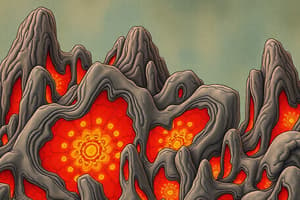Podcast
Questions and Answers
What defines a rock?
What defines a rock?
- A mixture of gasses found beneath the Earth's surface
- A collection of organic materials
- A loose aggregate of minerals
- A hard mass of mineral matter comprising two or more rock-forming minerals (correct)
Which type of rock is formed through the cooling and consolidation of magma?
Which type of rock is formed through the cooling and consolidation of magma?
- Sedimentary rocks
- Intrinsic rocks
- Metamorphic rocks
- Igneous rocks (correct)
Which process describes the formation of sedimentary rocks?
Which process describes the formation of sedimentary rocks?
- Alteration under high temperature and pressure
- Cooling and solidification of magma
- Formation from volcanic activities
- Compaction and cementation of fragmentary materials (correct)
Which branch of science is concerned with the description of rocks?
Which branch of science is concerned with the description of rocks?
What are monomineralic minerals?
What are monomineralic minerals?
What is the primary process by which sedimentary rocks are formed?
What is the primary process by which sedimentary rocks are formed?
Which of the following is NOT a stage in the formation of sedimentary rocks?
Which of the following is NOT a stage in the formation of sedimentary rocks?
What type of metamorphism is primarily influenced by heat?
What type of metamorphism is primarily influenced by heat?
Which of the following rock pairs includes a metamorphic rock derived from an igneous rock?
Which of the following rock pairs includes a metamorphic rock derived from an igneous rock?
Sedimentary rocks are also referred to by which of the following terms?
Sedimentary rocks are also referred to by which of the following terms?
Flashcards are hidden until you start studying
Study Notes
Rocks
- Form the Earth, comprised of minerals
- A hard mass of mineral matter with at least two rock forming minerals (e.g. granite & gneiss)
- Physical and chemical composition varies depending on the minerals
- Formed from molten magma beneath the Earth's surface
Petrology
- The study of rocks (from Greek words "petra" for rock and "logos" for science)
- Petrography deals with rock description, including its composition and properties
- Petrogenesis studies the origin and formation of rocks
Rock Occurrence
- Sedimentary rocks are most abundant, with shales making up 52% of the total
- Igneous rocks are the second most abundant, with granite accounting for 15%
Rock Formation Processes
- Igneous Rocks:
- Formed through cooling and consolidation of magma (either within or on the Earth's surface)
- Also known as primary rocks
- Sedimentary Rocks:
- Formed by disintegration and decomposition of pre-existing rocks, followed by transportation and cementation of fragmented material
- Also referred to as secondary or clastic rocks, often stratified
- Metamorphic Rocks:
- Result from the alteration of pre-existing igneous or sedimentary rocks under high temperature and pressure
Types of Rocks
- Classified based on their mode of formation:
- Igneous Rocks: Solidification of molten magma, often non-laminar with a massive structure
- Sedimentary Rocks: Formed by the consolidation of sediments derived from the breakdown of older rocks, transported by wind or water
- Metamorphic Rocks: Formed by the transformation of pre-existing rocks under intense heat, pressure, or both
Sedimentary Rock Formation Stages
- Four main stages:
- Weathering: Breakdown of pre-existing rocks
- Transportation: Movement of sediments by wind or water
- Deposition: Sediment accumulation in low-lying areas
- Diagenesis: Transformation of unconsolidated sediments into hard rock
Metamorphic Rocks
- Result from chemical or physical changes to the original rock
- Formed from the transformation of igneous and sedimentary rocks under high temperature and pressure
- Two main types of metamorphism:
- Thermal Metamorphism: Dominated by heat
- Dynamothermal Metamorphism: Combined effect of pressure and heat
- Examples:
- Sandstone forms quartzite
- Shale forms slate or schist
- Limestone forms marble
- Granite forms granite gneiss
- Dolerite forms hornblende
Studying That Suits You
Use AI to generate personalized quizzes and flashcards to suit your learning preferences.




